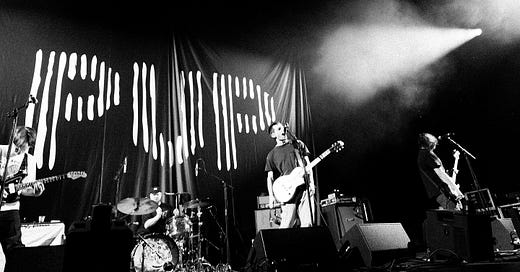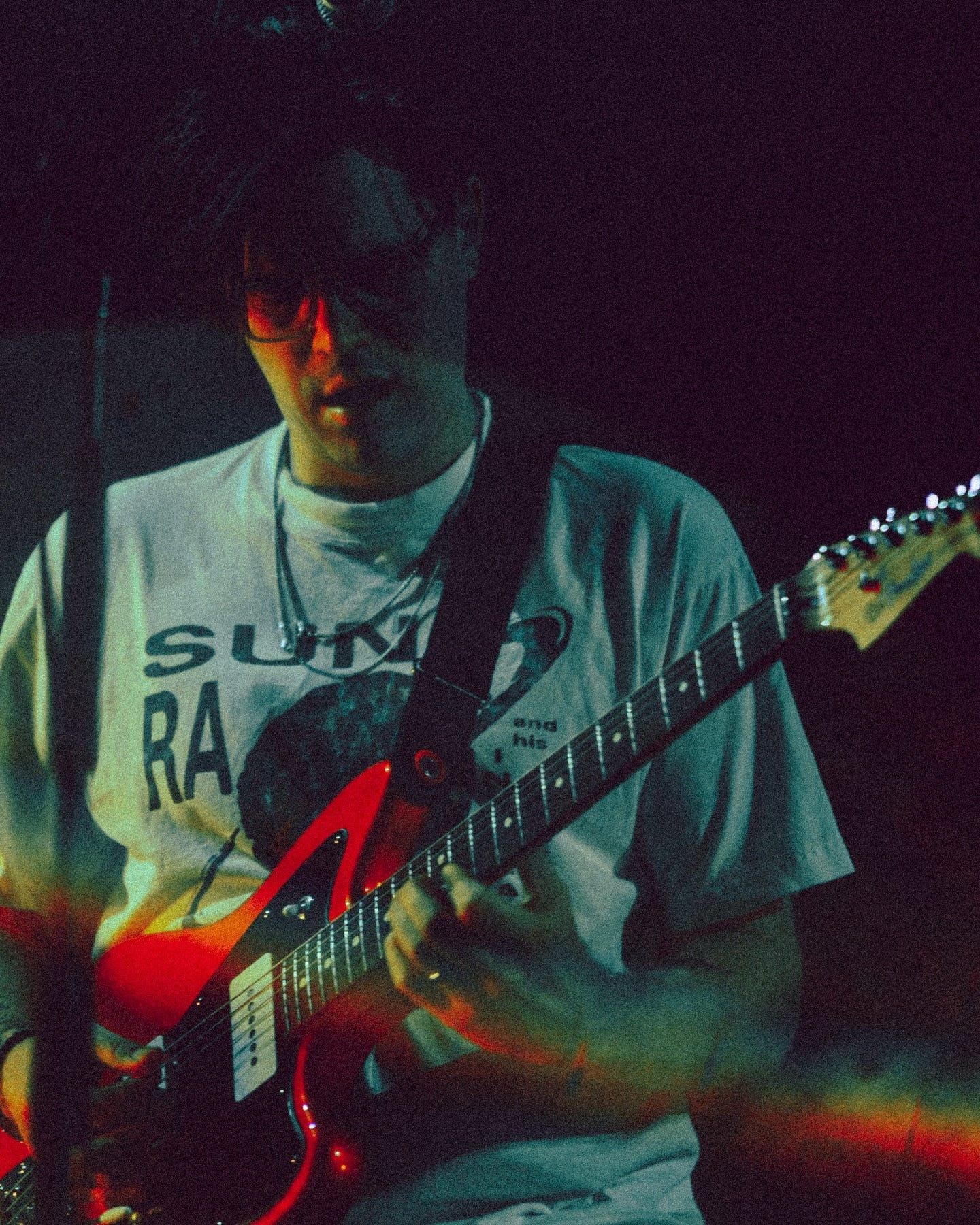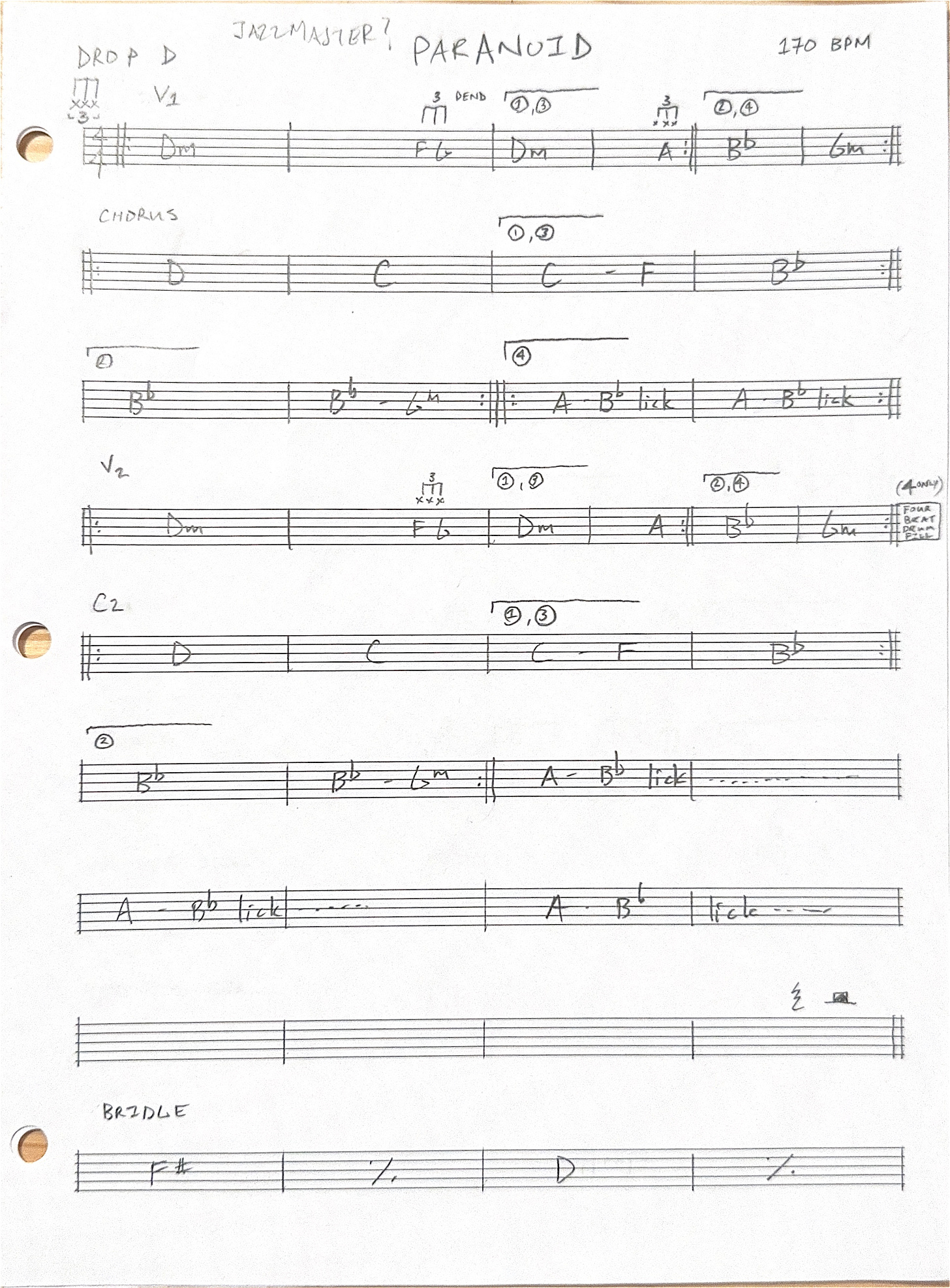PUP: We all want the same thing but how we get there is different
A conversation with lead guitarist Steve Sladkowski
Welcome to Human Pursuits, the column that features need-to-know names and stories in media and other creative spaces. Today, an interview with PUP’s lead guitarist Steve Sladkowski.
The last time I saw PUP live was in 2019.
They played the Wisehall, a small venue on the city’s east side. I went with Dan. Finn Wolfhard from Stranger Things was there, too. He was standing stage right.
Dan and I were not.
My memories of that night are mostly fragments. The smell of beer and sweat in the crowd, the sensation of my feet sticking to the floor during bangers like ‘Scorpion Hill’ and ‘DVP’.
Mostly I just remember the steeze. That rare, beautiful ability to inject style into whatever it is you do. It’s not something that everybody has, and it’s not something that can be manufactured. You either have it or you don’t.
That night, I walked away thinking PUP has it in spades.
While it’s impossible to trace steeze to a single member, as a noted guitar-guy, I’ve always had a soft spot for the band’s resident riffer Steve Sladkowski.
Angular without being abrasive, technical without being tedious, his approach to the instrument pulls as much from Joni Mitchell and Miles Davis as it does Andy Gill or Rivers Cuomo. Like me, he’s a bit of a creative omnivore, pulling inspiration from a variety of sources. And so it was a real delight to break bread with him at Nuba shortly before PUP took the stage at Rogers Arena opening for Sum 41 last weekend.
Our edited and condensed conversation touched on Steve’s desire to slow down, PUP’s new single ‘Paranoid’, the band’s forays into Substack, what makes Joni Mitchell so amazing, his recent nuptials, and more.
After our interview, I met Leah in Yaletown and she asked me how it was.
“He’s everything you want a rockstar to be,” I said.
And I really meant it.
Also, shout to The New Garde herself
for connecting me with this pupper. Subcribe to her newsletter if you haven’t already.Ethan: How was the show in Victoria last night?
Steve Sladkowski: It was good. It was one of the smaller shows on the tour. Tonight is going to be the biggest indoor show we’ve ever played—
Ethan: It’s at Rogers Arena, right?
Steve Sladkowski: Yeah, so it’ll be different.
Ethan: That’s kind of insane. The last time I saw ya’ll, I think it was at the Wisehall. You were rocking the ‘Big Country’ Vancouver Grizzlies jersey.
Steve Sladkowski: I’ve had to reconsider the amount of jerseys I wear on stage. People would text me every time the Raptors lost, asking “Are you okay?”
Ethan: I was going to ask: what is the tour wardrobe looking like right now? How many jerseys are in the steamer trunk?
Steve Sladkowski: There are no jerseys. I’ve been pretty big on the Dickies work pants. They’re easy. I can put them in a dryer and not worry about shrinkage. I’ll pair those with different tees. One from Noah, one from Wales Bonner. I think I’ve got an Online Ceramics one. Anything that was on sale at SSENSE while Christmas shopping for my wife. Laughs.
Ethan: I was gonna say, the lack of jerseys is giving happily married.
Steve Sladkowski: She gives me the benefit of the doubt. I have a critical mass of tattoos. It means I can wear a lot of sleeveless jerseys, even though I’m not overly muscular.
Ethan: For what it’s worth, I’ve always thought you had a great sense of style.
Steve Sladkowski: It’s fun, you know? And also I can write it off. Laughs. If I see something cool and we’re about to film a music video or go on tour, our accountant says I can do that.
Ethan: Charge it to the PUP LLC.
Steve Sladkowski: Not to get too into the weeds, but the way we do it, we each have individual taxation, as well as corporate tax—
Ethan: My readers are gonna go feral for this transparent accounting.
Steve Sladkowski: It’s crazy when you realize you’re basically a small business. That would’ve been unthinkable when we started the band 15 years ago.
Ethan: That was a recurring theme in a lot of my conversations last year. said, “Everyone wants to say they’re starting a media company, but you really should say you’re starting a small business…”
Steve Sladkowski: You’re the CEO and the only employee. It’s strange. The landscape for everything feels very strange right now. We just put out a single. A few years ago we would’ve done a big track premiere on Noisey or something but now…
Ethan: It’s so disparate. I think the best strategy is also more work than it used to be. It’s talking to Noisey but it’s also talking to Human Pursuits. You don’t know what’s going to catch fire.
Steve Sladkowski: I remember pre-pandemic we were sitting in a hotel in Hamburg, talking about TikTok, and deciding I would download the app just so we could secure our handle. But it feels like I don’t have the capacity for that sort of thing anymore. I don’t know if it’s because I’m old, or what.
Ethan: You guys still manage your own socials?
Steve Sladkowski: We do. We have management that helps us sometimes if we’re in a different time zone. ‘Paranoid’, the new single, came out while we were on the flight from Toronto to Victoria, so they stepped in on that one. I’m not paying for WiFi. That’s actually one of my favourite things about flying these days. It’s a chance to disconnect.
Ethan: It’s the best.
Steve Sladkowski: I feel like that’s in everyone’s consciousness at the moment… There’s a sense of fatigue, and I don’t know if it’s from being constantly inundated with information or what. I think people want imperfections or to feel connected to something more human…
That was an approach we wanted to get back to with some of this new music that’s starting to leak out — not that we ever left it behind necessarily — but we’ve gotten better as musicians, whether it’s playing together or on our own. The last record was so maximal, there were a lot of overdubs, there was a saxophone, and all of that stuff was cool, it made sense at the time, because of the pandemic… But it was nice to return to something that sounds like the 4 of us in a room.
It’s sort of the same thing with our Substack. We want to treat it like a blog or a zine. There’s less pressure.
Ethan: I think people are tired of having their identities fractured, or maybe defined, by the discourse. Everything feels so calculated, it’s cooler just to post whatever feels good in the moment.
Steve Sladkowski: I worry about what this is doing to people’s brains. And not in a The Atlantic sort of way.
Ethan: From a creative standpoint, there’s also something really draining about having so much information feeding into your brain. Everything is so fleeting. You might see an image or video that inspires you, but then it’s gone and you forget it almost instantly.
Steve Sladkowski: Right? There’s that tweet about how humans were never meant to interact with this many people and their opinions. We aren’t wired for that, which is probably why everyone is completely insane now.
More and more, I find myself trying to avoid my phone. I have one of those severe app blockers. It’s not the Apple one, I had to pay for it, and it’s the best money I ever spent. I’m able to go 8 hours without Instagram, or anything.
[PUP] is four people with distinct personalities… We all want the same thing but how we get there is so different, and I think that’s what gives the music its spark.
As you said, though, sometimes I see something that’s worth my time and consideration. I’m trying to really relish that and force myself to pay attention to it. Novels or non-fiction or magazine articles. Stuff that requires your brain to be engaged. My wife makes fun of me because I’ll have like 120 tabs open on my phone at one time, but I do go back periodically and try to clear some out.
Ethan: There’s also something to be said about having some space from things as they publish. Sometimes I’ll have a tab open for weeks and then look at it again and wonder why I ever cared. And closing it feels really powerful.
Steve Sladkowski: Or you’ve already read something newer that puts that previous piece into context. We don’t need that instant gratification.
Ethan: Is it harder navigating that impulse on the road?
Steve Sladkowski: Some of it’s unavoidable, and that can be frustrating. But I’m trying to get up and walk around, move my body… What I really relish is using this time to avoid my phone. I’ll ask our manager to cover more of the social media stuff, for example. I read a whole novella yesterday.
Ethan: Sick — which one?
Steve Sladkowski: I’m reading Paul Auster’s The New York Trilogy right now. It’s a series of detective stories, but they’re sort of meta and post-modern, so they’re also about writing and detective stories.
Ethan: That’s cool — I would add it to my Goodreads if I had one.
Ethan: Given that the band is ramping up for a new album, I’m interested to know, where are you with your songwriting and playing. From everything we’ve discussed, it feels like, spiritually, you want things slower and more focused, and I wonder if that applies to music, too.
Steve Sladkowski: The four of us are so particular and neurotic that there’s always going to be a slight tension. I think that’s important. It’s four people with distinct personalities as humans, but also creatives. We all want the same thing but how we get there is so different, and I think that’s what gives the music its spark.
Personally, I felt like I had gotten away from an integral part of my personal creative process, particularly on the last record. I have a background in jazz, and I used to make charts for all our songs. I would use them as mind maps. We would be writing, and, from one rehearsal to the next, we’d make micro changes to songs, and I’d sit there with a music stand and a pencil and write everything out. It allowed me to be creatively non-committal…
I think the word “slow” is a good observation. On this record, I forced myself to be a bit more intentional. I’d often go with my first idea. I would roll with it until somebody noticed my part was clashing. If nobody really said anything, I sort of adapted the part until it was where it needed to be. It was helpful because, on days that were tense, or it felt like we were just spinning our wheels, it gave me permission to stop thinking about music for a bit. It was the closest I could come to shutting the laptop and not thinking about my job.
Over time, I found musicians who look in between the spaces of genres to find the connective tissue and find a way to meld them together.
Ethan: Writing music with a pencil is so crazy to me. I can’t think that way.
Steve Sladkowski: We have this idea that art and creativity should be this all-encompassing thing. But I found this open-ended approach was the easiest way for me to work. Like, I'm just gonna keep playing this part this way until there’s a breakthrough. I’m not going to stop, I’m going to keep working at it, but I’m also not going to kill myself figuring it out.
On ‘Paranoid’, the first part I’m playing, is the exact same from day one. It underwent virtually no changes.
Ethan: Not killing yourself for art is a very good idea. And also one that’s hard to overcome.
Steve Sladkowski: Handwriting the charts, and leaning back on my collegiate education, really helped make the record feel more intentional.
Ethan: So about the jazz of it all. I’ve always been interested in how you incorporate that background into PUP, and particularly how you draw inspiration from someone like Joni Mitchell, who I know you’re a big fan of.
Steve Sladkowski: I think what’s interesting about Joni Mitchell — besides the fact she’s one of the greatest Canadian musicians to ever live — is that she seems to have a relentless curiosity. If you track her music from the 60s to the 80s—
Ethan: She’s like a different person.
Steve Sladkowski: Exactly. She has live records from the 80s playing with Pat Metheny and Wayne Shorter, just these A1 titans of jazz. And I’m like, how? I don’t know if I’ve ever figured it out. But in my mind, wanting to learn about bebop was similar to wanting to learn about folk music or bluegrass, which are not dissimilar to punk. The rhythmic language and syncopation of those genres are not that different. It can be more, or less, complex, depending on what you’re playing, but being able to play eighth notes quickly is a unifying concept among a lot of Western popular music.
For a long time, I thought I had to be a jazz musician because I was studying jazz. But I loved rock music… And so, over time, I found musicians who look in between the spaces of genres to find the connective tissue and find a way to meld them together. Somebody like Marc Ribot, who played with Tom Waits, for example.
What’s great about our band is that Stefan [Babcock, lead singer] writes these amazingly catchy vocal melodies and then bubbling underneath is all of this weird shit, which we hope warrants re-listening.
Ethan: Yeah, I think curiosity and longevity tend to go hand-in-hand. It’s great to consider your audience, but at the end of the day, you need to be working in service of your art. And that may not always create something that is popular.
Steve Sladkowski: [Producer] John Congleton, who worked on some of these new songs with us, says creative decision-making shouldn’t be made in fear. It’s important to think about the audience, but it can also be limiting when it comes to risk-taking. I’m known for these angular riffs, but if the song needs me to do something that sounds like The Weakerthans, that is fine, too.
Ethan: You gotta operate in service of the art, other than your ego. If you have the luxury and the time to create art that you want to make, you should probably do that.
Steve Sladkowski: Growing up, if I didn’t ‘get’ a record right away, I sort of discarded it. But now, partially because I’m a working musician, I’m so much happier to go along for the journey, even if it’s not always the best.
Ethan: Or maybe it’s not your journey.
Steve Sladkowski: Exactly.
Ethan: As I mentioned, you got married over the summer, as did I. I kind of hate when people ask if marriage changes anything, but I do wonder if it’s influenced your priorities or the way you manage your work-life balance?
Steve Sladkowski: I mean, the biggest thing is just realizing the power of unconditional support.
Ethan: It’s the best.
Steve Sladkowski: It’s also been great to have an outside perspective on how the band operates. Sometimes my wife will ask “Why do you it this way?” and it’s like, “Hmm, why do we do it that way?” Even if the answer ends up being “Well that’s what works for us,” it’s helpful to have someone ask.
Beyond that, though, I’m not sure much has changed. I probably try to buy less bullshit on the road. Records, clothes, books. If I’m going to buy something, I’d rather buy her a gift. Maybe we’ll piggyback a vacation off our tour dates. It’s been eye-opening for both of us to have her come out on the road. She’s experienced the highs and the lows. Like, one time it was my birthday and we were in San Francisco. We went out to a beautiful restaurant for dinner, went to sleep, woke up at Coachella, and played the show. She was there and it was really glamorous. The next time, she’s in a nine-seat Sprinter van with us in rural Germany, and there’s no vegetarian food for her to eat and she’s like “Jesus Christ.” We got this amazing photo of her pulling from a bottle of wine in a parking lot. Laughs. I think she had slept five hours.
Ethan: XO Tour Life, baby.
Steve Sladkowski: There’s so much mystique wrapped around creative fields. I really revel in popping those bubbles for people.
Steve Sladkowski is the lead guitarist of the rock band . He lives in Toronto. You can subscribe to the band’s Substack here.








